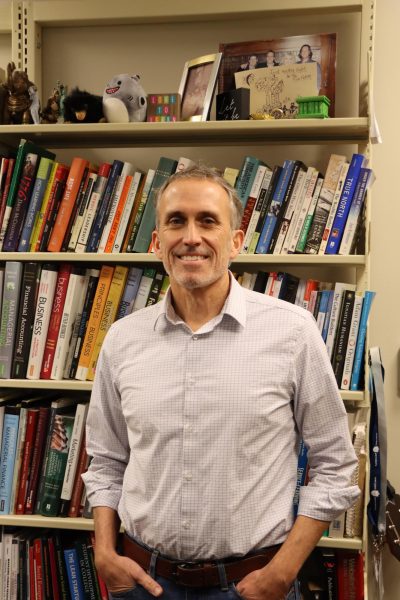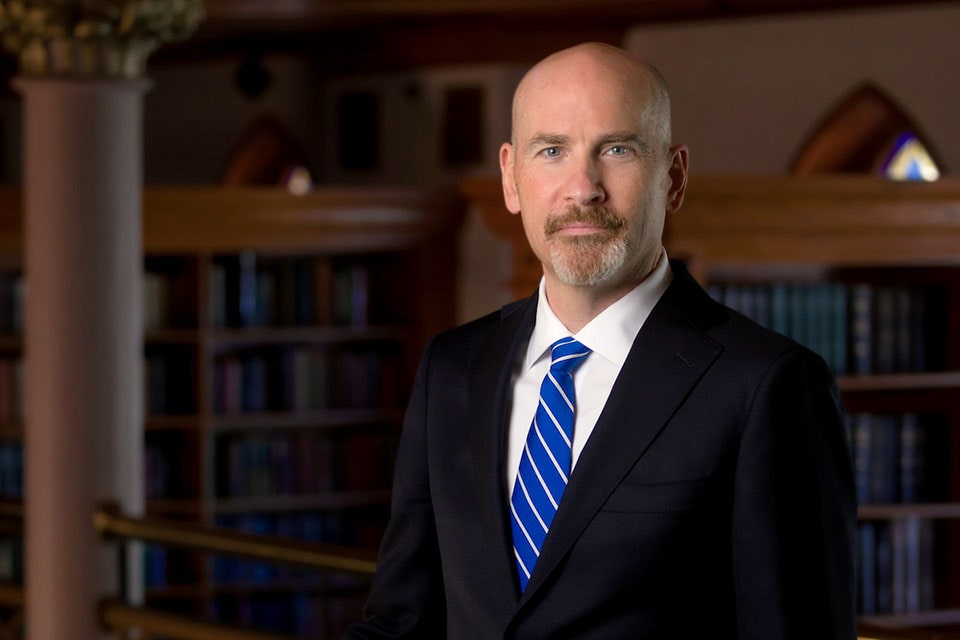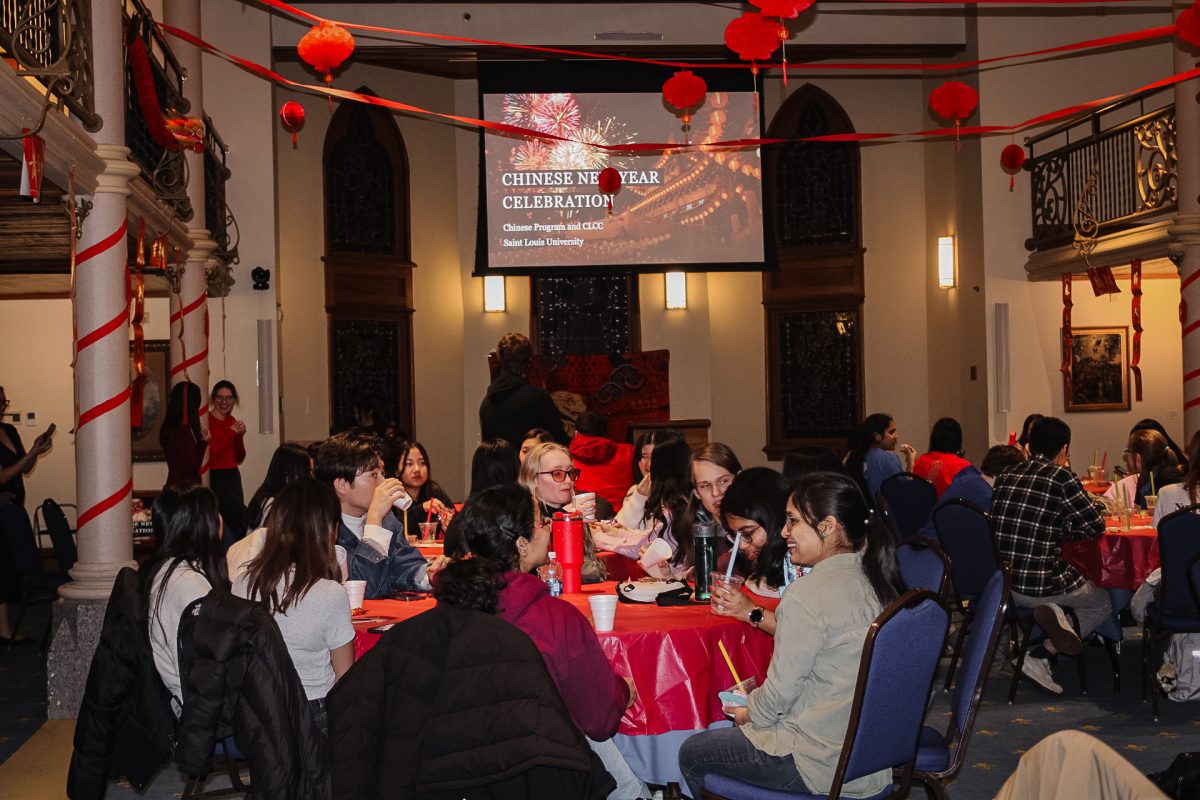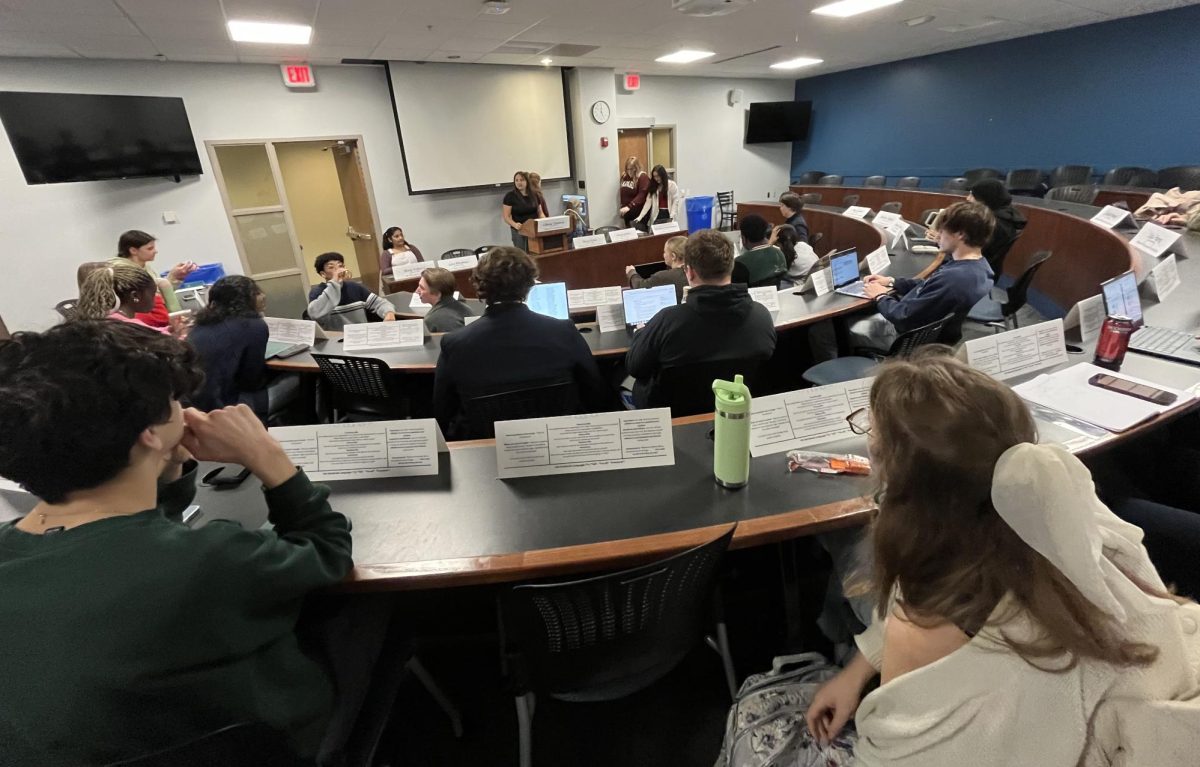On a fall evening in 2022, the seventh floor of Grand Hall was loud with music. However, it was not a stereotypical dorm party nor a drunk karaoke scene. Instead, a group of business students were neatly huddled around a middle-aged man strumming an acoustic guitar.
He candidly sang folk and bluegrass covers of mainstream ballads. Between each song, he would humbly interject with a fascinating musical anecdote or impactful business lesson he had learned throughout his playing career.
The man was Rob Boyle, a singer-songwriter turned professor.
A distinguished associate professor of management at Saint Louis University, Boyle brings a unique blend of musical and academic expertise into the classroom. With five studio albums and over two decades of teaching experience, Boyle’s career has spanned major shifts in both the music industry and higher education.
A native of Maine, Boyle’s musical journey began in his youth, playing guitar and performing in bands throughout high school and college. He signed his first record deal at age 25. This early experience, according to Boyle, “breathed momentum into my [his] music journey,” and resulted in three albums written while living out of Wisconsin and Toronto, Ontario. Over the years, Boyle has continued to record and perform, regularly playing weekend gigs and writing songs.
This combination of real-world experience and teaching command, culminated in the Fall 2024 semester, when Boyle introduced a new course, Rhythms of Innovation: Charting the Course of the Music Industry (MGT 3930). A recent addition to the university’s Collaborative Inquiry Core requirement, the course explores groundbreaking changes in the music industry while equipping students with tools and discourse to analyze contemporary innovation across various fields.
“Music has given me the gift of a nice side hustle, a lot of great friends and the catharsis of a side identity where I can shed my professional day job and become a musician at night,” Boyle said. “Music is such a universal language… I feel fortunate that it’s my avocation, which resonates with people and allows me to draw it into the classroom.”
Along with his musical pursuits, Boyle has built a longstanding academic career. With two master’s degrees in Administration and Organizational Management, along with a Ph.D. in higher education, he has found a passion for teaching while consistently incorporating his expertise. Before joining SLU, where he has been teaching for 20 years, Boyle held administrative positions at several institutions, including the University of Wisconsin-Steven’s Point and the University of Missouri.
Boyle’s research largely provided the foundation for the new course. In 2022, he was asked by publishing company EBSCO to write a chapter on innovation for a book covering various business concepts. Drawing on his music industry experiences, Boyle crafted a case study exploring the shift from analog to digital production and the rise of streaming platforms.
Rhythms of Innovation, first offered following Boyle’s selection for an external faculty fellowship program, primarily examines the evolution of music creation and distribution. Beginning with a historical foundation, students ultimately analyze contemporary innovations such as Artificial Intelligence (AI) and the metaverse before applying them to their own respective fields of study. The course is housed within the Richard A. Chaifetz School of Business.
“It’s been partially my experience, my age and the idea that I had this [topic] researched on,” Boyle said. “When the fellowship program came in saying, ‘We have a little bit of funding if you’d be willing to develop a course,’ and I’m very grateful that it happened.”
In a class of about 20 students, Boyle’s administrative background helped foster a tight-knit, collaborative community among students from diverse majors and colleges. Each week, students engaged in discussions, analyzed guest speaker insights and shared ideas in pairs or small groups. Some memorable guest speakers include musician and educator Scotty Huff, singer Steve Ewing and songwriter and producer Nicole Witt.
“If you are patient with the diversity that you have in your arsenal, it ultimately pays off in my experience,” Boyle said.. “It’s [diversity] got to be facilitated well, but it ultimately pays off.”
Students praised the course for its creativity and inclusivity. Senior Lily Kinnison, a marketing major minoring in music, said Boyle’s teaching style encouraged open dialogue.
A musician and performer herself, Kinnison said she was initially drawn to the class because of the intersection of music and business. She also said the course would inform her future work.
“I think a lot of classes can be very lecture-heavy, but this one was so interactive,” Kinnison said. “From day one, Rob was clear about creating a comfortable environment where no ideas were bad ideas. That made it easier to contribute my ‘half-baked ideas’ without fear of judgment.”

Arthur Simões, a senior majoring in international business and minoring in marketing, appreciated how Boyle’s structure encouraged meaningful connections among classmates.
“I appreciated the way Rob put everyone together every single day to speak with someone different,” Simões said. “It was really cool how we could share our experiences with other students. I definitely think that his class is one every SLU student needs to take at least once.”
The course’s emphasis on creativity and innovation resonated with Brandon Truong, a senior studying international business along with leadership and HR management.
“Rhythms of Innovation with Professor Boyle was one of the most inspiring classes I’ve ever taken,” Truong said. “The collaborative environment made us feel like we were truly contributing to the future of the music industry — not by shying away from unfamiliar technology, but by embracing it and using it to our advantage.”
For Boyle, the course is about more than just the music industry. It’s a lesson in how innovation can shape yet disrupt any field. Each class offered insights into contemporary challenges, particularly with the integration of AI in daily life, from generative search engines to AI-driven customer service systems.
“One of the greatest ways to honor one’s past is to teach. You walk into a classroom and say, ‘This is how it worked for me,’ and share your story. All the things that shaped me as a musician since I got signed to that record deal in 1995 — I can bring so much of that into Management 3930 and offer it back. It feels incredible to share my experiences and say, ‘Here’s what I’ve learned,’” Boyle said. “It’s truly fulfilling in that sense.”
Editor’s note: This article’s author was a student in Rob Boyle’s Rhythms of Innovation in 2024.















